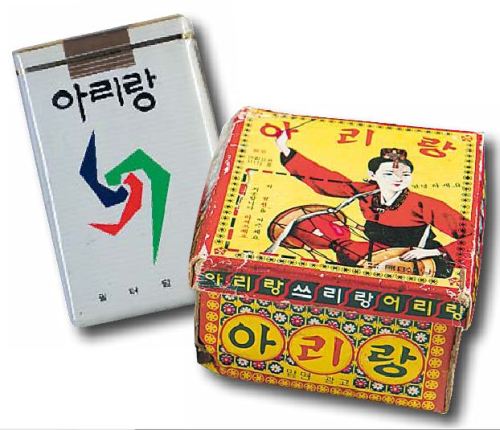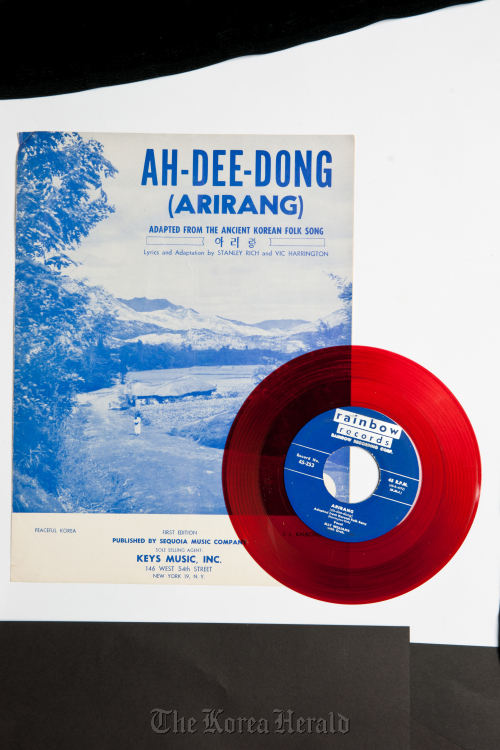
Historical documents, music records show cultural legacy of popular folk song
Widely known and sung, “Arirang” is very often considered the unofficial national anthem of Korea.
Yet many aren’t aware that King Gojong, the last king of Joseon, and his wife, Queen Myeongseong, enjoyed listening to the song late at night, that it was made into Korea’s first opera, and that it even inspired American jazz musician Oscar Pettiford to write a piece of his own.
Starting April 4, the National Folk Museum of Korea is holding a special exhibition featuring the folk song, showcasing a total of 2,000 Arirang-themed items including video and audio clips, books and documents.
“The purpose of this exhibition is to examine what the folk song means to the Korean people,” said curator Lee Geon-wook.
“One of the stories featured in this exhibition is about an elderly woman who was forced to leave Korea at a young age by the Japanese to work as a sex slave for their military overseas.
She ended up living in Cambodia all her life, unable to return to her home country. But she never forgot about the name of her hometown, her parents, and the main melody of ‘Ariring.’
This story is one of the many examples of what the song means to Koreans and their shared experiences.”
The first two sections of the exhibition focus on the history of the song, starting from the late Joseon period to present-day Korea. One of the must-see items is an excerpt from “Maecheonyarok,” a memoir by scholar Hwang Hyeon (1855-1910). The book records that both King Gojong and Queen Myeongseong enjoyed listening to “Arirang” even late at night.
Widely known and sung, “Arirang” is very often considered the unofficial national anthem of Korea.
Yet many aren’t aware that King Gojong, the last king of Joseon, and his wife, Queen Myeongseong, enjoyed listening to the song late at night, that it was made into Korea’s first opera, and that it even inspired American jazz musician Oscar Pettiford to write a piece of his own.
Starting April 4, the National Folk Museum of Korea is holding a special exhibition featuring the folk song, showcasing a total of 2,000 Arirang-themed items including video and audio clips, books and documents.
“The purpose of this exhibition is to examine what the folk song means to the Korean people,” said curator Lee Geon-wook.
“One of the stories featured in this exhibition is about an elderly woman who was forced to leave Korea at a young age by the Japanese to work as a sex slave for their military overseas.
She ended up living in Cambodia all her life, unable to return to her home country. But she never forgot about the name of her hometown, her parents, and the main melody of ‘Ariring.’
This story is one of the many examples of what the song means to Koreans and their shared experiences.”
The first two sections of the exhibition focus on the history of the song, starting from the late Joseon period to present-day Korea. One of the must-see items is an excerpt from “Maecheonyarok,” a memoir by scholar Hwang Hyeon (1855-1910). The book records that both King Gojong and Queen Myeongseong enjoyed listening to “Arirang” even late at night.

Another interesting item is the copy of a record by American jazz musician Oscar Pettiford, titled “Ah Dee Dong Blues.” The jazz double bassist and composer visited Korea during the Korean War (1950-1953) to perform for the American soldiers.
He is said to have listened to the melody of “Arirang” while he was in the bathroom, as someone outside was whistling the song. He wrote down the notes of the song while he was still in the bathroom, and wrote a piece of his own inspired by it. The name of it comes from mishearing the title of the Korean song.
The term “Arirang” has been a popular name for products since the 1940s, including cigarettes, crayons, matches and radios. There is also an interview clip with an elderly woman who describes how she married her husband because she was so charmed by the way he held his Arirang cigarette, which was one of the priciest tobacco products in the late 1950s.
The exhibition also showcases about 200 copies of “Arirang” records, sung by different artists throughout modern history. Visitors can also get a glimpse of how “Arirang” is performed and celebrated in North Korea.
The exhibition runs until May 21. For more information, call (02) 3704-3114 or visit http://www.nfm.go.kr/index.nfm.
By Claire Lee (dyc@heraldcorp.com)



![[AtoZ into Korean mind] Humor in Korea: Navigating the line between what's funny and not](http://res.heraldm.com/phpwas/restmb_idxmake.php?idx=644&simg=/content/image/2024/04/22/20240422050642_0.jpg&u=)




![[Herald Interview] Why Toss invited hackers to penetrate its system](http://res.heraldm.com/phpwas/restmb_idxmake.php?idx=644&simg=/content/image/2024/04/22/20240422050569_0.jpg&u=20240422150649)

![[Graphic News] 77% of young Koreans still financially dependent](http://res.heraldm.com/phpwas/restmb_idxmake.php?idx=644&simg=/content/image/2024/04/22/20240422050762_0.gif&u=)




![[Exclusive] Korean military set to ban iPhones over 'security' concerns](http://res.heraldm.com/phpwas/restmb_idxmake.php?idx=652&simg=/content/image/2024/04/23/20240423050599_0.jpg&u=)



